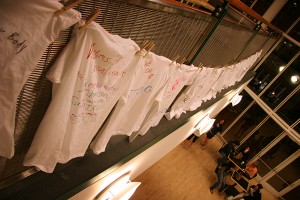 This week, the Feminist Action Coalition (FAC) hosted Take Back the Night Week as an effort to raise awareness and create a space for conversations about sexual violence and abuse.
This week, the Feminist Action Coalition (FAC) hosted Take Back the Night Week as an effort to raise awareness and create a space for conversations about sexual violence and abuse.
Take Back the Night, an internationally organized event, stems from the second wave feminist movement of the 1970s that aimed to raise awareness regarding sexual assault and intimate partner violence.
“The historical past is really the best part about [Take Back the Night],” said Emma Lawler ’09, an organizer of the consent workshop event. “It’s been happening for years and years. Our take on it is that it can be new, but it also hearkens back to the history of how many women have been having issues.”
The week began with a showing of “Law and Order: Special Victims Unit,” and was followed by The Clothesline Project, a discussion concerning intimate partner violence, a student demonstration throughout campus, a consent workshop, and will end with Walk A Mile in Her Shoes in Marshalltown, on Sunday.
The series of events is not only meant to raise awareness of sexual violence, but also serve as a space where survivors of sexual abuse and assault can talk about their experiences.
“[Take Back the Night] is about reclaiming the night as a space where women can feel safe about walking home at night alone, and not be afraid of rape or sexual assault,” said Jessica Southard ’10, a member of FAC.
One of the longest-standing traditions in Take Back the Night is the Clothesline Project, which can currently be seen in the Spencer Grill. The project consists of student-made t-shirts that bear messages regarding sexual violence and abuse, which are then hung on display in the Grill.
“The Clothesline Project is something that Grinnell has been doing for a while,” said Zoe Schein ’12, a participant in the event. “Personally, I think it’s really effective. This raises awareness, and then people hopefully try and do something about it. I think that it is a really important part of it, though it isn’t the only event.”
Another event held during the week was the consent workshop, led by Lawler. During the workshop, participants learned how to practice asking for and giving verbal consent, as well as how to make it “sexy,” Lawler said.
“The consent workshop was maybe one of the most important things we can do in terms of solutions,” Lawler said. “I think the consent workshop is one thing you can do to really actively change the rape culture . . . actively trying to put consent as a part of that script can have a huge effect on the number of sexual rape and assaults.”
According to Lawler, the event is important to the entire campus, regardless of whether they have experienced sexual assault or not.
“Even if people don’t know someone who’s been affected, they probably have a friend who hasn’t told them,” said Lawler.
Lawler said she hopes that Take Back the Night will make a permanent impact on the campus, not just this year, but in years to come.
“I hope that every year it gets bigger and bigger and that it becomes a conversation that we have on campus—that it’s something that we talk about,” Lawler said.


















































